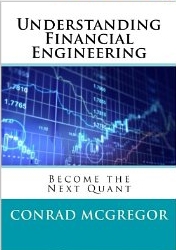 Michael Lewis writes entertaining novels, and “The Big Short” follows suit. The book focuses less on the mechanisms of the financial collapse and more on a few characters who were able to see that something was massively amiss and able to capitalize on it. Lewis tells the story of an ever pessimistic and self-righteous Steve Eisman, a fund-manager/ex doctor with Aspergers Syndrome named Michael Burry, and a few lesser known individuals with seemingly endless luck. The book is a quick read and has many anecdotes that will leave you scratching your head with their insanity. At times the story can be educational, but seems to gloss over the major causes and mechanisms of the crisis while trying to villainize certain, less humanized players.
Michael Lewis writes entertaining novels, and “The Big Short” follows suit. The book focuses less on the mechanisms of the financial collapse and more on a few characters who were able to see that something was massively amiss and able to capitalize on it. Lewis tells the story of an ever pessimistic and self-righteous Steve Eisman, a fund-manager/ex doctor with Aspergers Syndrome named Michael Burry, and a few lesser known individuals with seemingly endless luck. The book is a quick read and has many anecdotes that will leave you scratching your head with their insanity. At times the story can be educational, but seems to gloss over the major causes and mechanisms of the crisis while trying to villainize certain, less humanized players.
Lewis makes it seem that very few investors and financial “specialists” were able to foresee the financial crisis in the making, but in reality the truth is a bit less straightforward. Having had a front row seat during the run-up and subsequent unraveling, I can say that argument is far from factual. The truth is that most money resides with institutional money managers which include pension funds, insurance companies, mutual funds, foundations and endowments. These are what the street refers to as “real money players” because they buy investments with cash, not on margin like hedge funds. These real money players are “investors” because their intention is to take investable cash and lend it to borrowers so that the real money player feels like he is earning an adequate return for the risks being taken. When the federal reserve keeps short-term interest rates low, these real money buyers have a very high cost of sitting on cash even if they believe that the investments do not provide adequate risk-adjusted returns. As yields and returns compress, some of the naive institutional buyers are lured into riskier and riskier investments as they try to appease their constituents (shareholders, customers, policyholders, pension boards, donors, beneficiaries). Unfortunately, the many educated and astute institutional investors who never bought any of the “toxic assets” and even saved their constituents billions of dollars by raising cash in euphoric market conditions against the wills of their bosses, never made the front page of Bloomberg. Many saw the crisis coming, but did not have the tools or ability to execute a “short” to directly benefit from their knowledge. When reading “The Big Short“, keep that fact in mind because the personalities and social defects of the characters in the book had more to do with their windfall than did their prescient knowledge.
The second big hole in the book is the portrayal of the banks as big dumb brokers that never knew the extent of the garbage they were holding. I do believe the banks were caught off guard by the toxic waste they were holding, but mostly by the speed with which things deteriorated and their inability to toss the garbage overboard before the water overcame them. The truth is that they were fully aware of what they were doing, but they just did not care. With the repeal of the Glass-Steagall Act in 1999, banks were given a golden ticket. The Glass-Steagall Act had been around since the Great Depression as a way to separate commercial banks from investment banks. By repealing this act, congress provided banks with the perfect platform to make billions of dollars and, in so doing, set the world up for a financial crisis. Mortgage brokers originated loans without abandon because they earned a commission and sold the risk to banks. Banks packaged up the crappy loans and paid rating agencies to put a “highly rated” stamp on them so that they could then sell the risk to naive investors. The mortgage brokers made money, the banks made money, and the rating agencies made money. The only problem was that the banks were left holding a bundle of mortgages because the market blew up before the banks could blow the rest the rough pipeline.
Despite a few shortfalls, “The Big Short” is highly entertaining and suggested for a weekend read.



